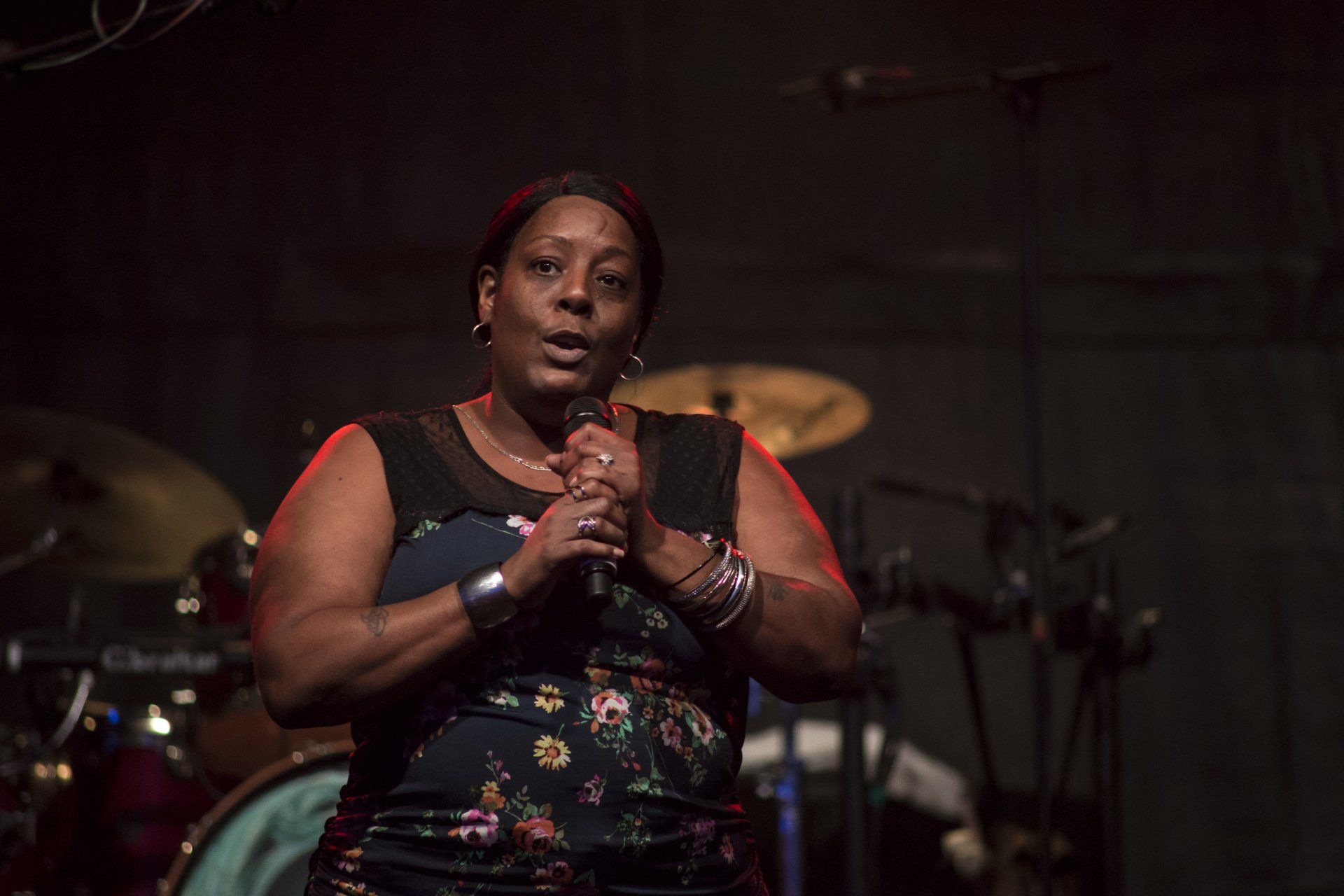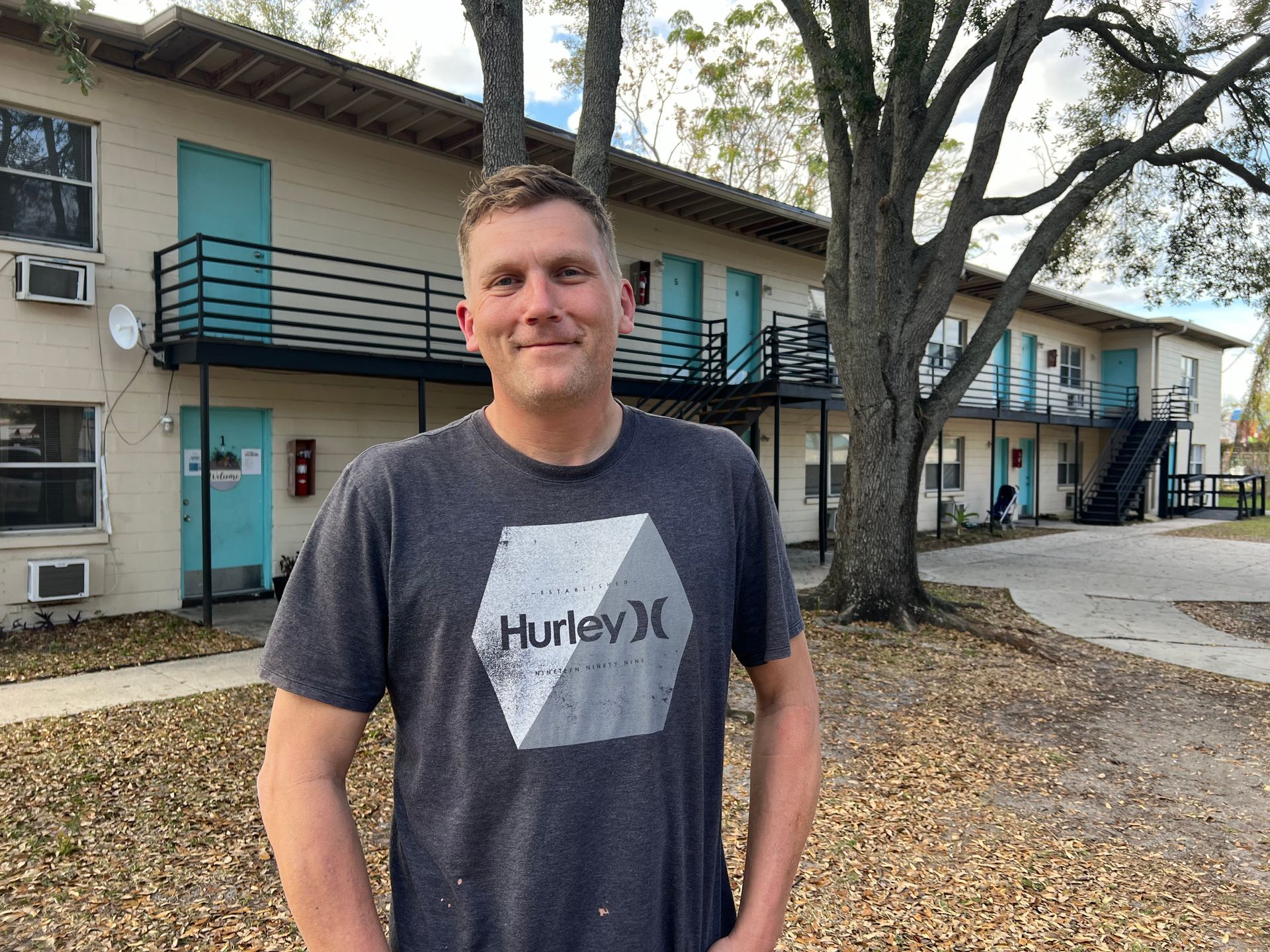
On Wednesday, February 7th, Jason was one of the 237 men who were swiftly exited out of our Men's Service Center when an unexpected fire broke loose in our 100-man dorm. And while no physical injuries ensued, over 230 men found themselves heartbroken as their temporary home, lit up in flames.
For many men, like Jason, the Coalition is a haven, where individuals can get assistance navigating their crisis with homelessness. "For me, it's not just a safe haven...with everything that is provided here...I've been able to really focus on the things I need to."
When the fire struck, suddenly shelter and crucial programs and services were halted—completely disrupting our ability to house these men and provide food to everyone on campus, since our kitchen and dining facility were also affected.
In the span of a few hours, community partners quickly came together to provide temporary solutions so that the Coalition could continue to provide shelter, meals, and services to all.
Lynx busses shuttled over 200 of our men to shelters across the city, and other organizations like Shiloh Baptist Church, converted their gymnasiums into temporary accommodations, which provided over 100 of our men with a safe place to lay their heads. Jason says he was "overwhelmed with the response [from the community]."
"They had probably 120 something around their beds. . already with blankets on there. Linens on there. And when we came in, they had dinner ready. It was more than I expected."
Thanks to you and our incredible community, we were able to keep men like Jason safe and secure during this emergency. Beds, linens, shower services, meals, and so much more were completely donated to the Coalition, all to ensure that we can keep programs and services afloat.
As we continue to wait for the building to be deemed safe for re-opening (currently looking at a minimum of 30 days), we just want to thank you for caring, because it really does mean the world, to us and people like Jason.
"Thank you, sincerely, not just for myself, but I know there's plenty of people here that don't realize how much one person can [make a difference]. One person coming in, dropping off a bag of chips can change someone's day....and it impacts all the way down...it does a lot for people. It saves lives."
With your support, we can continue to help men like Jason recover from life's unexpected tragedies. Donate now here: http://weblink.donorperfect.com/MSCFIRE
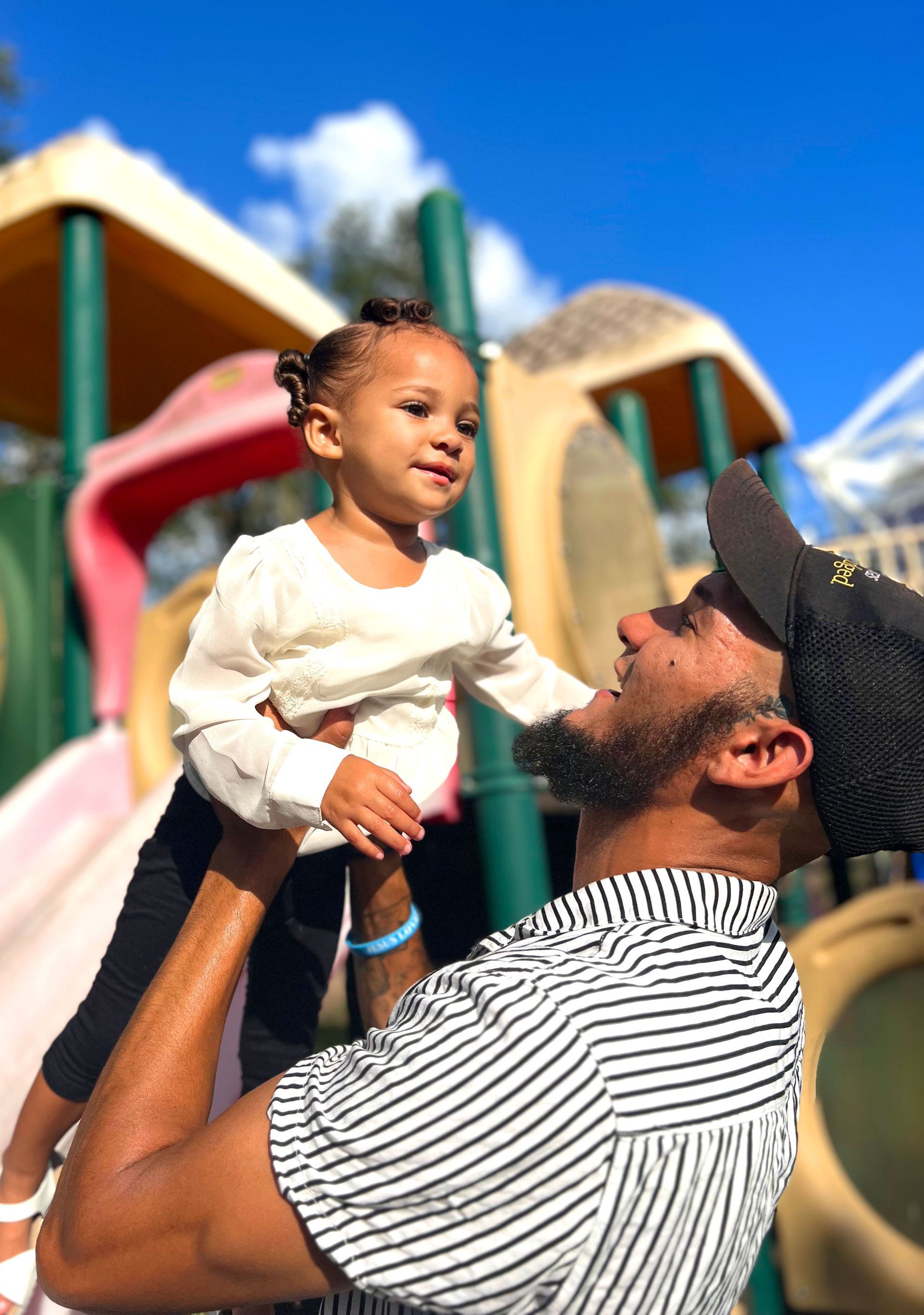
Landy had recently joined our Men’s Service Center when his 2-year-old daughter Nevaeh was suddenly handed off to him. With just the clothes on her back, Landy had no choice but to quickly become the sole caretaker of his child, amidst his own struggles.
Just a year back, Landy and his girlfriend were first-time parents living in their 2-bedroom apartment in Kissimmee, Florida. But when things in their relationship became turbulent, they decided to separate, leaving Landy to seek shelter elsewhere. Eventually, both individuals began to struggle with homelessness independently.
Landy temporarily found refuge in his mother’s home and took Nevaeh with him. He had a few months with his mother before she would need to move, and he would find himself unsheltered once again. During that time, Landy worked diligently to secure additional income and look for resources in the Orlando area. However, when it was time to return to the streets, he returned Nevaeh to her mother.
“I’ve always worked during this...but they started cutting my hours...and then I got into a car accident. So, I lost the only transportation I had to actually make extra money and keep me afloat.”
Landy eventually discovered the Coalition. He spent a week visiting our Intake and Diversion Center before a bed finally opened in our Men’s Service Center. He felt a sense of relief when he realized he would now be able to work towards his goal of restabilizing himself.
A month and a half after his arrival—and days before starting a new job—Landy received the news that Nevaeh’s caregiver would be unable to care for her because of health concerns. Before he knew it, she was handed off and now his complete responsibility.
“She was really, really, really, skinny. Once I got her, I noticed her health wasn’t [good].”
Once on-site, our Housing Specialists worked quickly to transfer both Landy and Nevaeh into a family dorm in our Center for Women and Families. Within a few hours Nevaeh was given clothing, shoes, socks, and a brand-new stroller; and within a few days she was enrolled in our on-site daycare.
“You guys made sure she was in good hands, and she had everything she needed.”
Today, Nevaeh is at a healthy weight and now has access to three nutritious meals a day—something that gives Landy immense joy as a father. When she is in day-care, Landy works. He has since secured a second job, and alongside his Housing Specialist, Ana, is working his way towards permanent housing. The father-daughter duo recently shifted into one of our bridge housing units and look forward to the day when they’re back in a home of their own. Reflecting on this time with his daughter and how he’s had to step up as a father, Landy says:
“I never had a father figure...that’s why I work to improve. It’s a wonderful feeling being a father. I wouldn’t change it for anything in the world. My daughter keeps me going. I don’t know where I would be if my daughter was not in my life.”
Landy is one of the many fathers that we serve at the Coalition. If you feel inspired to help families like this, consider making a donation today. Donate here: https://bit.ly/father2023
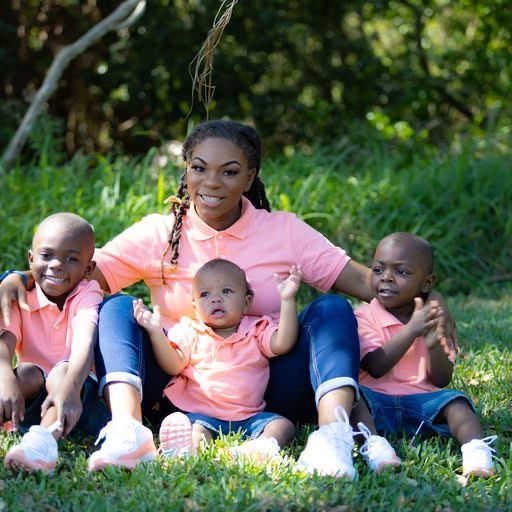
In any given year, the Coalition serves hundreds of moms like Vanique. Your support helps end homelessness for these families. Will you give today to honor a special mom in your life? Donate today.

Born to drug-addict parents, Paige became a product of the foster care system and didn’t have the luxury of growing up in a stable home. When she aged out of foster care, she reunited with her birth parents and shifted between her great aunts’ house and the streets. Her parents became homeless , and it wasn’t until she met her boyfriend, that she gained some relative stability.
In 2014, Paige quickly realized that her newfound stability came at a cost. “I was 36 weeks pregnant with Trenton, and I was covered in bruises all over my face and arms...”
A victim of severe domestic violence, Paige experienced a mix of physical, emotional, and sexual abuse for years.
“They were going to force me to testify against him as a witness...but the day he had court, I was in the hospital giving birth so the judge wouldn’t let them use me and everything he had felony charges for: domestic violence, battery on a pregnant woman, and a bunch of other ones... all got dropped down to misdemeanors because they had no witness.”
Through that relationship, Paige became a mother of four children. She went through cycles of leaving and returning out of fear that she couldn’t do it alone. However, after years of abuse and seeing how the domestic violence affected her children, she finally shifted away from her abuser and into safety with a new apartment.
In 2021—amidst COVID —Paige was unfortunately evicted from her low-income apartment because of late rent. After years of pain, she found herself on the streets again. And with nowhere else to turn, Paige joined her parents in a wooded homeless community in Kissimmee, where she and her four children slept in a tent for six months. Through a video of the camp shared across social media, Paige’s story was shared, and our Community Outreach team learned that Paige and her children needed a home.
In December 2021, Paige finally experienced some relief when she and her children became guests at Coalition for the Homeless. Through the Coalition, Paige has been able to secure food stamps, utilize daycare services while working, and get on track for therapy.
“I have the best Case Manager here, Angie! She’s done a lot of referral letters for me. They just helped me start therapy because I need to work on myself. Angie is amazing. I love Andrea (too). They’ve helped me when I needed resources...the same day...I have it.”
Today, Paige is not only liberated from her abuser, but she’s also in the process of securing new employment as a teacher’s assistant. Additionally, she is actively working with her housing specialists to secure permanent housing. She looks forward to the day when she and her children are back on their own feet.
-----------
Last year, 24% of Coalition residents were victims of Domestic Violence. Your continued support allows us to offer resources and stability to these individuals. Consider giving a gift today. Your gift will be matched dollar-for-dollar until November 11th, thanks to our Morgan Match Campaign.
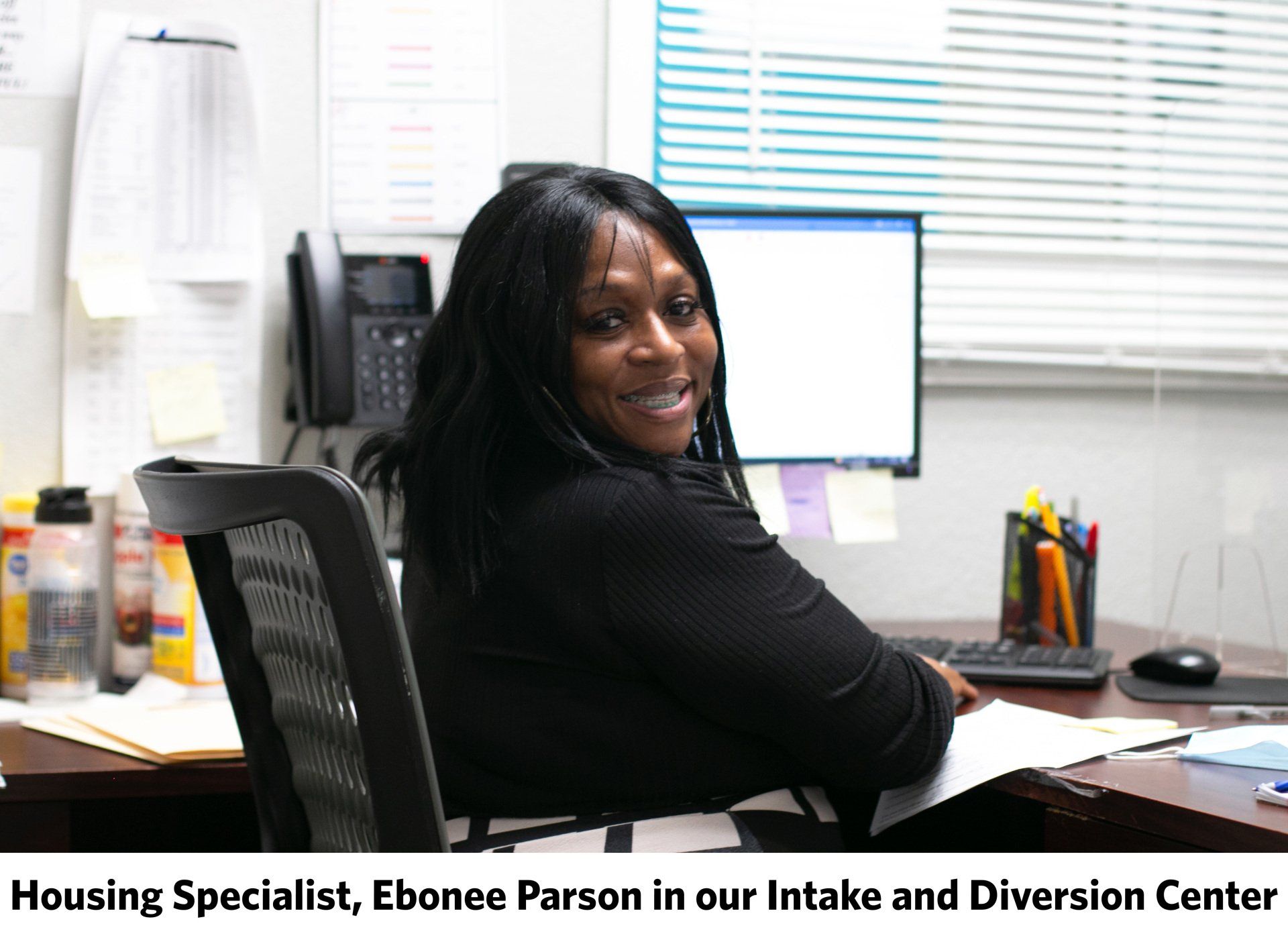
“We didn’t have enough money saved because rent is so much...when it was time to get out, I just didn’t have $2000 on hand to put down on another apartment, so I was freaking out...and the deposit was $1500 on itself.”
Inspired by this story? Give now!
If you give between now and November 11th, your gift will be matched dollar-for-dollar thanks to our Morgan Match Campaign.
MORE FROM THE CLIENT INTERVIEW
Interview Month: July, 2022
Name: Monique W.
Can you briefly explain your situation, how it started, and what the Coalition did for you?
Okay. I moved from New Jersey last year (last April). I settled into my apartment. I was with my partner at the time, and fast forward, the lease is up. We’ve broken up by this time (we broke up in May). June 3rd came—that was the day we had to move out—he went to his place, he was already settled, I did not. So I called my friend in Ocala and asked if I could stay with her. The one week turned into 2 weeks, so I stayed in Ocala, but I was still traveling back and forth for work. I work as a security guard. So I was driving an hour and a half to work, an hour and a half back to Ocala for two weeks straight!
How long were you two together?
This month (July) would have been our third year anniversary.
You said you were originally from NJ, correct?
I am, I am a New Jersey girl!
I was in the New Jersey foster care system ever since birth. My Mom is a schizophrenic, she is bipolar and she also suffers from epilepsy, so all of those issues created a very toxic environment for me. So I was in foster care ever since I was 6. I got adopted at 12, but that didn’t work out for me. So...you know...I had to push myself. I had to motivate myself, I had to cheer myself up in place of them. So I've always been the type of person—if I was in a situation—I have to figure it out because I don’t have a support team, I don’t have a comfort net.
What brought you to Central Florida? Was it your boyfriend?
My partner actually. He is going through a very strange custody battle with his ex-wife. He came down here because he wants to be more present in the children's lives. He wants to just be a dad.
Do you have any children yourself?
No children. I would love a little crumb snatcher one day.
How old are you?
I am 33, I will be 34 at the end of the month
Have you kept the same job throughout the whole process?
No, when I first got here, I transferred from the cheesecake factory, and I did not like the work environment, so I resigned. I ended up working at Subway for a little while. I was assistant manager there, but I did not like the work environment, so I moved on to Publix, to the deli, it was fine, but again, something about the fast food work environment that I am just not into. So I went back to security. I got my license. Did the classes and everything and went back.
Were you dealing with any other circumstances within this past year, when it came to having to move out? Health conditions? Or anything outside of your relationship that led to this situation?
No, it was literally the fact that we didn’t have enough money saved because rent is so much. We have to pay 1000 and 1 bills, so when it was time to get out, I just didn’t have $2000 on hand to put down on another apartment, so I was definitely freaking out. But no, it was just unfortunate that we couldn’t save the amount of money that I needed to place down on a new place. And then the deposit was $1500 on itself.
So all together the Coalition paid. They paid the prorated rent (which was a few hundred dollars), and then they paid the first month's rent, and then they paid the deposit as well, so that was a little over 2 grand that they paid in total to make sure that I was able to move in.
So you talked earlier about utilizing the resource of the Coalition. What did that look like to you? How did you exactly find us?
Well, I was online browsing to see if there were any resources or buildings that I could go to, that lent help to those who needed help. I know that the programs are kind of scarce now because the funding is not able to be dispersed, a lot of funding has been cut, unfortunately. So I just went on google, I browsed and Coalition was one of the first searches that came up. So I clicked on the link, went to the website, I was reading you know what kind of services they provide, I heard that it was a shelter, people can go get breakfast in the morning when they open, there is a place where people can take a shower if you don’t have anywhere to bathe, so I'm like... "Okay. Jackpot. I'm going to go down there."
Got there. They gave me initial paperwork, and I was matched with Ms. Ebonee, and she explained to me the process of what we needed from my end to get the ball rolling and she asked me exactly what I needed help with. I was telling her my feelings, my views and I was telling her there is help available for people who need it, but the thing is, people like me who have jobs—who are pretty okay—we need help too, because I'm not eligible for food stamps, I'm not eligible for healthcare. Why? Because they're telling me my $15 an hour that I make as a security guard is too much.
I pay cable, I pay utilities, I pay my phone bill, since I don’t get food stamps I have to buy food out of pocket, I got to drive a car sometimes, I have to pay for gas, I got to pay for insurance, I have to pay the car note...so exactly how is my little $15 not enough to say...she needs coverage for health. That’s absolutely absurd to me.
So you know, we went on, filled out the paperwork, and then I would say everything took about a week and a half, two weeks—it was a very quick process. It wasn’t drawn out at all.
If you could describe the Coalition in one sentence or word, what would it be?
I would put a few words. I know you said one, but it’s a hidden gem. It’s a hidden gem, it really is.
What was the most surprising to you about the Coalition?
The services that they offer and how not a lot of people know about it. I don't think many people know what the Coalition really does. I think that they think "oh, just the homeless." But they provide more than that. I mean technically, I wasn’t living on the street, but they helped me. They provide some stuff and they give you other referrals to other places, like if you wanted to get tested. I just feel like people complain that there's not enough help, but the help that is out there. Nobody utilizes it. And I wish that the Coalition would get more recognition in terms of just publicity. Because If I didn’t do that google search, I would have never found out about it.
What would you say to someone who donates to the Coalition?
THANK YOU!!!!!!!
Thank you. Thank you. Thank you. Like seriously. Those donations are what keep it afloat and we need these programs like the Coalition to stay functioning to keep doing what they do, to keep providing for those who are actually putting their egos aside and getting the help, because we need it. And I say we because I may need help again, in the future. You know? I'm not the one to turn my head away from help. Listen, I know the position I play, and I know I cannot do it all by myself so whatever means of help I can get, I'm going to take it. So for all the donors out there...thank you for your generous hearts, thank you for just supporting such a great, amazing cause. It is greatly appreciated especially from someone like me.
How has this experience changed you?
It changed me because it gave me a little bit more faith in humanity. I hate waking up in the morning, and I see the news and the world is just crumbling, but then you have little gems like the Coalition, that make me believe that there are still good people in this world, and I just pray that one day that we can all be on the same page on that, that we all can be in peace and we don’t have to be so mean to each other, you know?
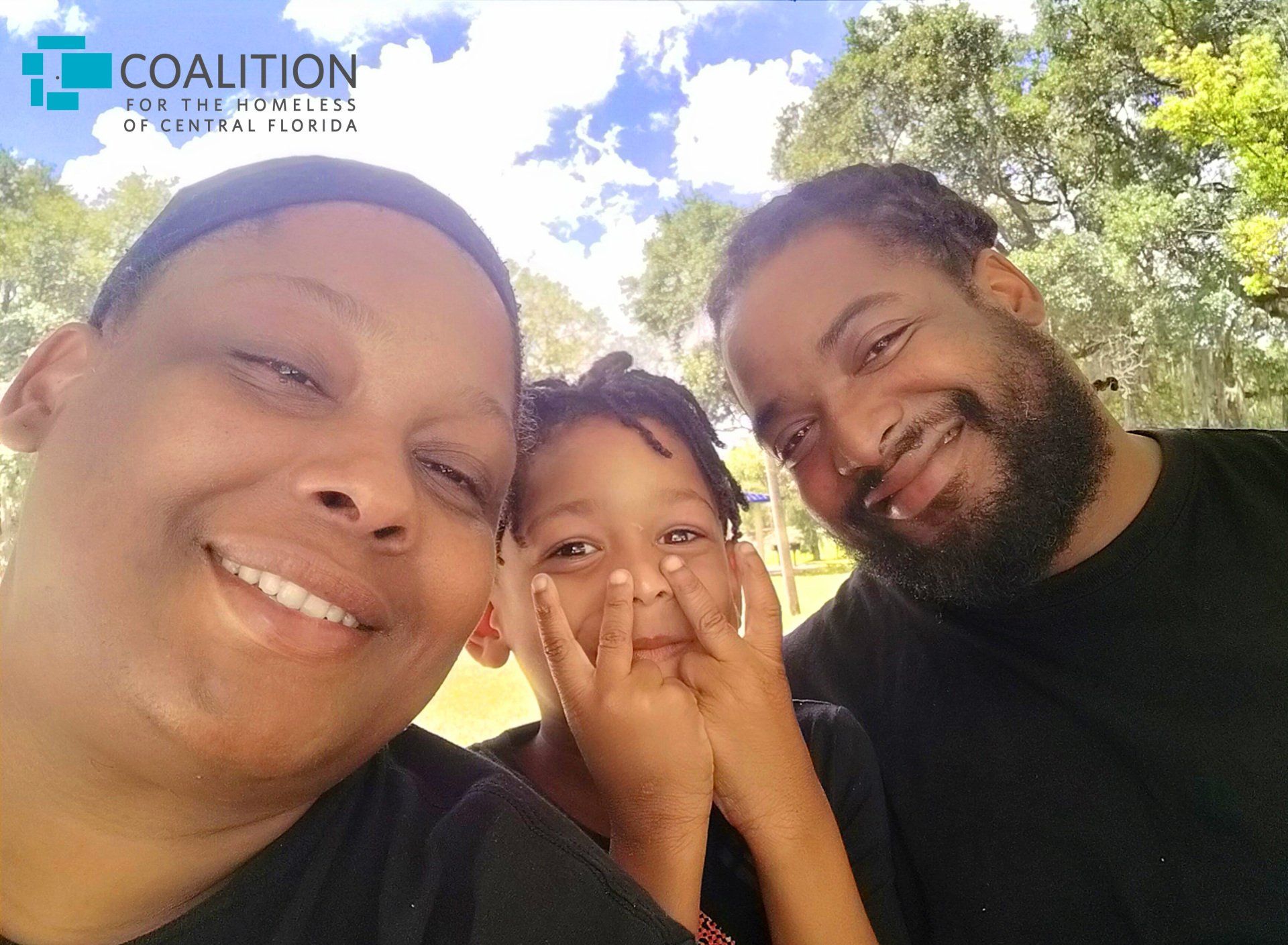
“I am so thankful for the Coalition for the Homeless programs and casework Cortney for the help she gave...me and my family have a place to call home again.”

Full Interview with Debbie
Name : Debbie S.
How did you lose your house or your housing situation?
Domestic violence, and the landlord decided to sell the home.
What other circumstances were you dealing with in the year or so prior to entry?
Abuse. Physical and emotional abuse.
I do. I suffer from panic attacks, PTSD, and anxiety. Those are the main ones.
Have you ever suffered with substance abuse?
Yes
Do you want to elaborate on any of that?
My boyfriend and I were getting hooked on drugs. So, it’s a blessing that the relationship ended the way it did because it was getting out of hand.
How long were you dealing with substance abuse?
I would have to say since I was maybe 28 years old. So nearly 20 years on and off, I’ve been struggling with it.
Have you been the victim of domestic violence?
Yes
What is it like experiencing homelessness?
I was homeless before for 8 months. It’s difficult because you have got to find out where your next meal is going to come from; how you’re going to make the money standing on the street corner, holding a sign. That’s the way that I did it. I unfortunately lost my fiancé. I became pregnant and I was able to get out of this situation, but he wasn’t able to come with me. So, two weeks later he ended up passing away. So that was a really tough one for me to handle.
How long ago was that?
2017 is when that happened.
The first time you were homeless, what course of action did you guys take?
Did you know about the Coalition at the time?
No, I did not. No. I had actually called law enforcement on myself, because my oldest daughter was with us and [I wanted] to see if they could help us because I was running at a dead end. I had no other options and the officer said “I’ll be right back” and he came back an hour later and said “you're right, I can’t find any place for you guys to go.”
So, he didn’t give you anything?
No. And I became a very severe alcohol. Very Severe. My whole first trimester I was drinking and thank God she’s okay, you know? But I live with that guilt (*begins to cry*) my whole life. But I’m just so grateful that she’s alright.
But I never stopped looking. I never gave up. Until we ran across a lady who ended up finding a detox center here in Orlando for me. And that's where I ended up going for a couple of weeks. And then I went to Aspire. I was transported to a treatment center, which was Aspire. I was there for three months and then they invited me to come to the home program, which was in Kissimmee, which I lived for a couple of years. And they helped me get the house that I just lost.
And how long were you in that house before you lost it?
3 years
This time, once you lost this house, what steps did you take?
I called law enforcement, of course, because of the domestic violence. I called the cops, and I said “please can you take us to the Help Now Center, because this is what is going on now.” And they took us to the center, where we stayed for a good three months. And they paid for a hotel for us for a couple of weeks and then we came here (Coalition).
The same day that we checked out of the hotel room was the same day my daughter had to get surgery to get a feeding tube put in. So, I knew that we were going to stay overnight for a couple of days, so I was going to use that time to look at the resources and everything. And the hospital ended up finding this place. And she says “Here are bus passes. Get over there. See if you can get in.” The first day they told me no, they didn’t have the space. The second day I came they gave me the spot.
What was the biggest challenge you faced and how do you feel you overcame it?
The biggest challenge definitely was substance abuse. I overcame it by leaving the situation that I was in because he was an enabler, and it was hard for me to stop, when he kept on doing it. And getting rid of him was the main problem.
Was being evicted from your home your card to leave the relationship?
I knew I didn’t want to be with him anymore and I was looking for a way out. And then it came, and I didn’t look back.
What was the most important thing that you think you lost when you lost your home?
My self-esteem. My confidence. My happiness. All of those things were gone.
What would you say is the hardest thing about being homeless?
Not having a support system. That’s so important. So important. If you don’t have that, you really don’t have anything. Honestly. We didn’t have a support system.
How does your experience change your perception of people who experience homelessness?
Oh wow. Because there’s people out there who don’t want to help because they think that you’re using their money for the wrong reasons. Which is true...some of us are...some of us did...but I just wish there were a lot more people who would help.
Because some people were really cruel. They would throw change at you, pennies, and I mean just awful things.
If you could describe your experience in one word, what would that be?
Traumatic.
If you were given a permanent place to live tomorrow, how do you feel that would change your life right now?
Tremendously. We’re actually going to be moving to Georgia this Saturday. Cortney was going to help me get back into rapid rehousing and the domestic violence compensation thing. She helped me with a lot of things. She extended herself to try and help to get things going and it was just last week when I decided that, you know, this is probably best for us. Because Florida has a lot of bad memories, and I can't get away from him. He always finds me. If I'm out of state, he can't find me.
How have your case managers helped you?
Cortney was able to get some clothes for my daughter which were much needed. She also gave me a voucher to go over to a church down the street here to get some outfits.
If you could describe the Coalition in one sentence or word, what would it be?
Comfortable. Very comfortable. I adjusted very well here. The other clients are really nice and helpful. I mean, especially helpful with my daughter, because she's got a feeding tube in. You know, they help out with her behavioral issues, and you know...they really try to give you a break and it’s really nice to have.
How did the Coalition help you?
I got my joy back, I got my peace back, I got my self-esteem back. Everything that was lost, came back to life. I’m serious, I’m walking around; I dressed myself up now. Where before, I just was in bed all the time and doing drugs and not taking care of myself. I would go weeks without a shower. That’s how bad I was about myself, I quit caring. My kids were not being raised properly. I’m surprised they didn’t get taken. Now it’s like a totally different life. Totally different and I couldn’t ask for anything more. You know, being here is a blessing. Being here is a blessing for me, because I know what it’s like to have nothing.
Anything else you want to share?
Oh, if it wasn’t for this place, I definitely would still be on the streets and I am very grateful. And as far as donations...once I get myself on my feet, I am giving back and I’m definitely going to start donating back to this place for all the help that they’ve given me. And for anyone who's listening to this, please donate.

Interview with Planell (transcribed verbatim)
Q: How has being a father changed your life?
"Being responsible; the desire to take care my children and give them what I never have in my country; to have a better life (now) than I have. Before I become—that was a mistake—because I become a workaholic. I became a provider...a material provider, not a father that loves...that deserves. Be there...for... when they need me; basketball games, when they have problems, their daddy is not there. Especially the girls, they really have it a crush on dad, because they have a problem with a boyfriend or whatever, dad is not there. It’s suffered, I mean. Sometimes you have to think...you have to put yourself in my shoes. I’m an immigrant; our dream is to do better. For ourself and your family; and in the back of your head, you’re always thinking you don’t want what I had in my country, for my children in this country, so you have to work hard. You have to do everything to make your wife happy—house, bills paid, you know work, work, work, work , and sometimes it’s a gap that we miss. And sometimes your children love you...with nothing. They don’t really care about material things because they're young. They just want you there (with them). So it’s just....it made me strong to work and provide, but at the same time I messed up and became weak because I was not really a good father and I thought I was. I was just a provider. That’s why my daughter calls me the donor, because technically yeah...I make enough, I brought up baby , and I gave everything, but I wasn’t there. I gave everything material... I didn’t give her the support and love; maternity love that a child needs. I was not there, I was working a nd in my mind ...I was so strong, I was a freaking workaholic. I became so workaholic, that my job was 6 months out of my house, come back to my house, I get the hot sheet and work for another company that wants to give me another job, until my company calls me again. Because when you have a trade, in my trade, another company that does the same thing, they might need you. So you call it, yeah you come, for another 3-4months....so I was like 'I love you, but I got to go.' But my children saved my life as a working man, but I screwed up as a father... "
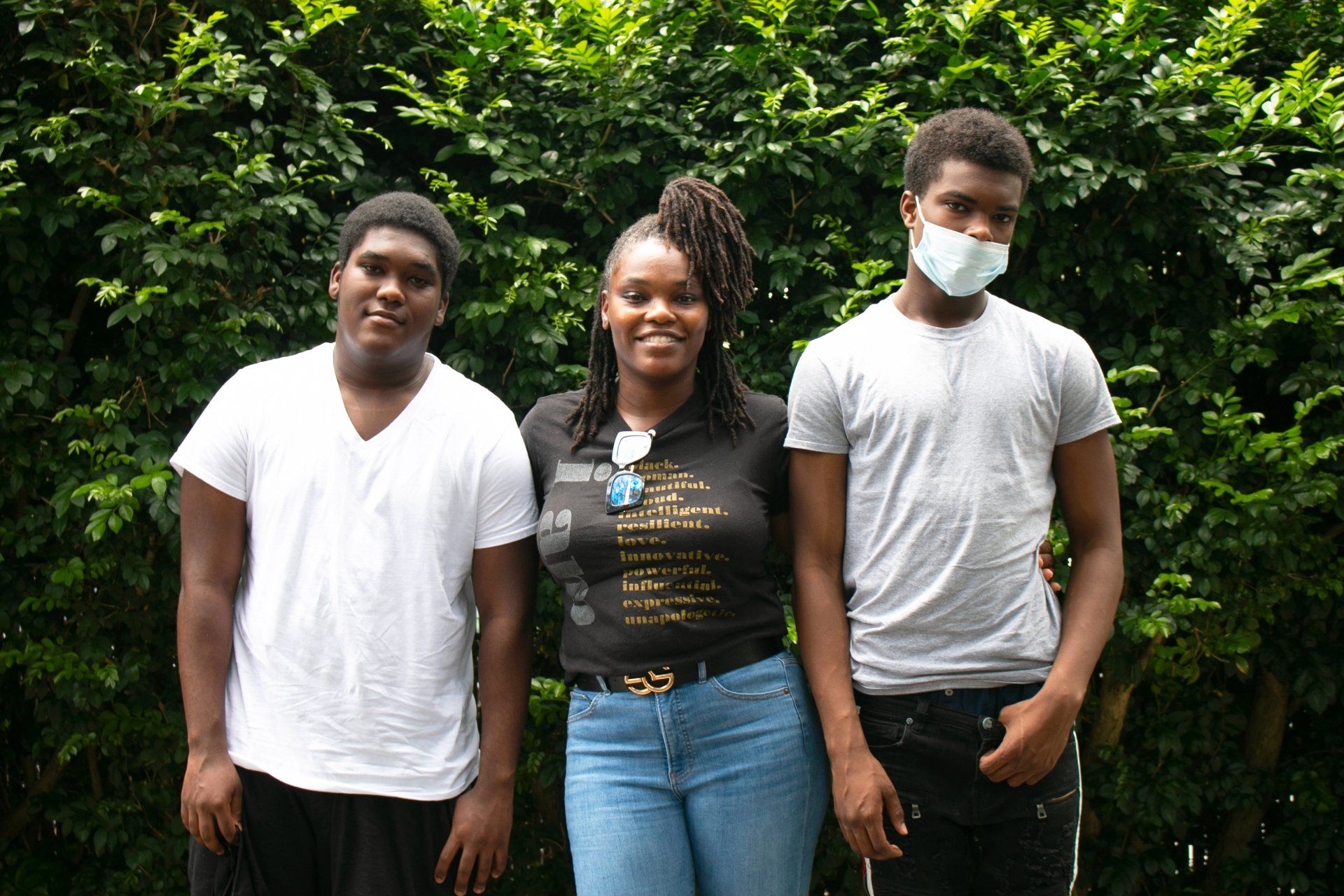
Full Interview with Erika
Name: Erika G.
How many kids do you have, and what are their names:
I have three kids and their names are: Jedidiah, Malakai, and Deuce.
When did you first go homeless:
September 2021.
When did you move into your new place:
Monday, April 25th.
Where were you born:
I was born in Shreveport, Louisiana. I was originally in the Foster Care system (in Louisiana and California) until I graduated High School.
What brought you to Central Florida:
I was with my youngest son’s father and he thought this would be a great place to start a family.
What did you do for work before:
I worked for nonprofits in Los Angeles, California: Shields for Families, Hope for Life, places like that. Currently I'm working to get my Masters in Social Work.
Where you experiencing any other difficult circumstances at the time of going homeless:
Yes. I already had a voucher (veteran) but rental rates were an issue. That’s how we got into homeless predicament: Sept 2021.
Did you experience food insecurity while homeless?:
In this current situation we were in, yes, we had issues with securing food. Mr. Walker (the social worker who we connected with) helped us with money out of his own pocket.
What was it like experiencing homelessness:
Not it. Stressful.
How long were you homeless:
Six months.
Where did you go initially:
I was paying for hotel rooms, and then it became too much. At the time I was also paying for boarding school for my son. So we sometimes slept in the car when we had to, then in the hotel rooms, then in the car.
How did you learn about the Coalition:
Through a social worker named Mr. Walter Walker. He specifically connected me to Angie Black, at the Coalition.
Angie said we could pay for a week for you all to stay at a hotel. I told her I had a voucher, I found a place, it's just about the inspection and everything is taking longer. Angie said "okay, if you qualify and if the landlord qualifies, we can pay for that deposit, and we can connect you with mustard seed and get your furniture." They did everything they needed to do, paid the prorated rent, and then we moved in.
What was the hardest thing for you:
Feeling inadequate. You know. I can’t provide for my children. I’m their Mom and now....um...it doesn’t matter how you got into it, or what you have, it’s in that moment you can't do what is supposed to be done. I didn’t grow up with my Momma and I never wanted to have my children feel insecure in that way. You know what I mean? They should feel secure. You know what I mean? I wanted to break some cycles and I wasn’t breaking them being homeless. I can’t.
What’s the most important thing that you lost when you lost your home
:
Ummm my self-sufficiency, you know?
What gave you hope/motivation at that time:
I pray a lot, you know. My children. And even the day I was really really down...Mr. Walker came, gave us money out of his pocket, and told us someone was going to help us...and that was a light at the end of the tunnel. I knew that something had to give, I just didn’t know when.
Describe your experience in one word:
HARD.
What was it like moving into your new place
:
It was a sigh of relief. You know? I know it’s a sigh of relief for them. You know? No lugging anything around.
Can you speak to me a bit about Motherhood, and what it's like being a mother:
I think overall, that being a Mom is a thankless job, it’s tiring, but it (um) it yields its fruit, when it’s time. So, I think that being a mom is about enduring. It's endurance. You have to be able to endure. You know?
You’re not going to be able to get it right every time. The majority of the time, you ‘re not going to get it right. There is no handbook. There is nobody...and everyone writes a book, but there is no one way to do...and how to parent. Because each child is their own individual and each is different with their own personality and their own needs. And so you have to table your parenting to that child and you're going to make mistakes, you're going to fall down A LOT...but you have to be able to endure, because it's about endurance and you see the fruit at the end. You know? You’re not going to seeing it right away. Sometimes it feels like you’re toiling in vain, but you’re not because you do see the fruit in your end.
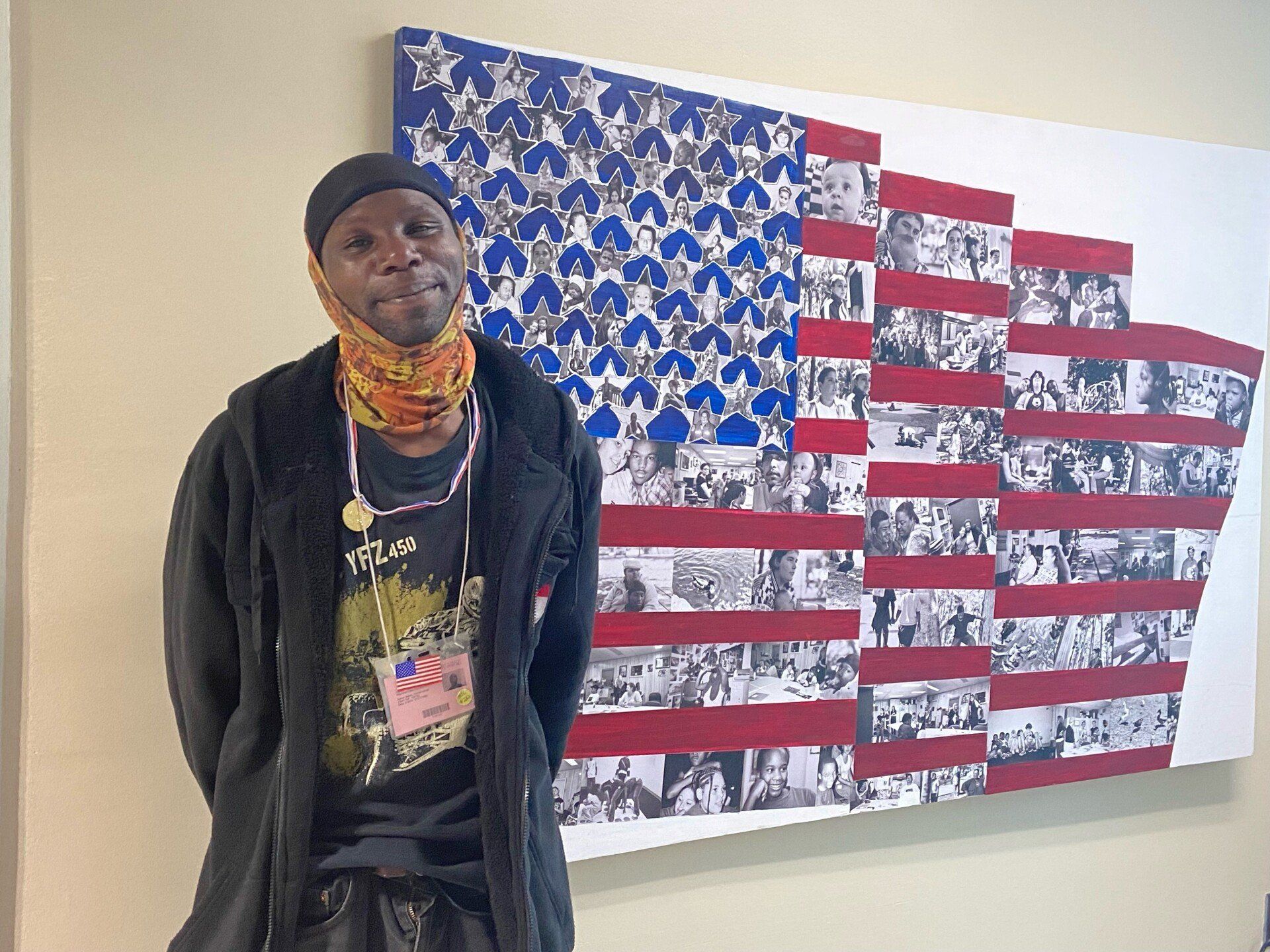
Daniel never expected to be homeless. An Army veteran, he served from 2003 - 2007, issuing and transporting weapons. After his contract ended, Daniel applied the self-discipline he learned in the military and pursued several licensures. Most recently, he had a well-paying career driving forklifts at a lumberyard in Jacksonville.
Then, personal tragedy struck. At the end of July, Daniel’s father was murdered. His 9-year relationship with his girlfriend ended. Reeling from the loss of his father, Daniel moved to Orlando in August to find a fresh start. He slept on sidewalks in downtown Orlando for a couple of weeks until he found a job at a warehouse and was able to rent a room at a hotel.
Things were looking up until another major setback happened. Daniel was arrested and served time in jail for something he said he did not do. He spent all he had to bond himself out and was released on October 17 with nothing to his name. “Losing everything has a way of humbling you,” says Daniel.
With nowhere to go, he turned to the Coalition for help. He’s currently working with his Housing Specialist, Sareena, to get into an apartment of his own, connect with the VA to access his benefits, and find a more permanent work situation. Daniel has been searching for a job every day with his late father’s words ringing in his head, “My daddy always said you gotta beat that concrete until you make it pay out.”
In spite of his challenges, Daniel does all he can to support his family. He sacrifices his own needs to send money to the mother of his three children, recently sending money that he’s earned through day labor to provide Halloween costumes and winter clothes.
Without people who support the Coalition, “I wouldn’t have anywhere to lay my head, no blankets, no sheets.” Daniel has had the opportunity to meet people who have stayed at the Coalition and are now in homes of their own. “It works. They got into housing programs, and they’re still in their apartments. All I can do is say thank you to folks who donate because they make it happen.”
Sareena commends Daniel for his positive attitude in the face of tragedy. “I never see him frowning, I never see him feeling sorry for himself. He just goes. I think his story shows that becoming homeless could really happen to anyone.”
Looking forward to getting back on his feet and into an apartment of his own, he says with a smile, “God has been good to me even when I haven’t been good to myself.”
